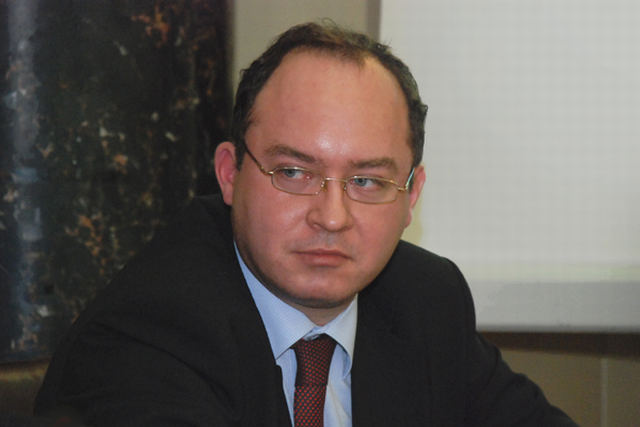Ukraine and Minority Rights
Today we'll be talking about the rights of minorities in Ukraine.

Corina Cristea, 07.03.2014, 13:09
Against the background of the latest developments in Ukraine, Bucharest has voiced concern over the rights of the Romanian community in the neighbouring country, which numbers 400 thousand people and makes for the second largest after that in Russia. Parliament in Ukraine has recently abrogated a law adopted in 2012, during the office of the recently ousted president Viktor Yanukovych, which set the legal provisions for an enlarged use of minority languages. The aforementioned law provided for Ukrainian as the official language, but also for the use of regional languages. The law, which says that regional languages can be used in business, school and other fields, was a key element in Yanukovych’s campaign. Although abrogated two years ago, the law is still in force, as the new interim leader in Kiev has chosen not to promulgate the abrogation decree. Here is Bogdan Aurescu, state secretary for strategic affairs with the Foreign Ministry in Bucharest, with more on the issue.
“The adoption of this law abrogating legislation on regional or minority languages undoubtedly was a mistake by the newly instated government in Ukraine, criticized by Romania and other European states or institutions and not only. The fact that the new interim president of Ukraine didn’t promulgate the abrogation law is certainly a good thing and the fact that there is an intention to adopt a new legislation is a positive aspect. In a phone conversation with his Ukrainian counterpart, Romanian Foreign Minister Titus Corlatean has straightforwardly called for the adoption of such a legislation a.s.a.p. and, more importantly, with the direct consultation of the minorities themselves, including the Romanian one, with assistance from the Venice Commission and the OSCE High Commissioner for National Minorities. The two institutions have issued critical notifications on the law on regional and minority languages and these deficiencies have to be fixed. What we want is the new legislation in Ukraine to comply with European standards in the field.”
Under the law that came into force in August 2012, Russian acquired the status of regional language in areas where it is the first language for at least ten per cent of the population, that is in 13 of Ukraine’s 27 regions, while for Romanian the law was enforced in Cernauti and TransCarpathia. A working group was set up in Kiev, including philologists and specialists in languages and social issues, who are working on a new law package in the field. ‘Ukrainian is the national language, but no restrictions will be imposed whatsoever, regarding language, nationality, ethnicity, religion. We have a democratic government, which guarantees everybody’s rights, said the Ukrainian interim president Oleksandr Turcinov, referring to the new law. Romania’s stance regarding the situation in Ukraine was steadfast, and in line with the stance taken by Western governments. But what would be the social and economic impact of the crisis in Ukraine on Romania? Bogadan Aurescu again.
“ As regards social implications, we have noticed that Ukrainian citizens have not rushed in large numbers to Romania’s diplomatic and consular offices in that country to get a Romanian visa. In terms of bilateral trade relations, however, we just cannot ignore the fact that last year trade exchanges between Romania and Ukraine stood on an upward trend. Romania’ s exports to Ukraine grew by 18% , while imports stood at 8.1 per cent, with the total trade volume standing at 1.8 billion dollars. And it’s all too clear for everybody that when there is an economic crisis, when, security-wise, a crisis is still rampant in one of Romania’s neighboring areas, risks are likely to occur, with respect to the neighboring states’ economy. And taking all that into account, the fact that last year Romania had the biggest economic growth across the European Union, which stood at 3.5 per cent, from an economic point of view, that was, to a certain extent, a guarantee for Romanian economy’s stability. We could see, however, that in the last few days, European stock markets have been affected by the situation in Ukraine. According to economic analysts, several currencies have been affected, the oil price has gone up, and so has the price of gold, the clashes in Ukraine being described as the obvious reason for the most recent developments.”
Romania has voiced its concern over the situation in Ukraine, and has deemed as necessary the economic assistance the international community should offer Kiev, through the IMF and other financial institutions. Such an assistance should also be the result of a tighter coordination between the United States and the European Union.






























